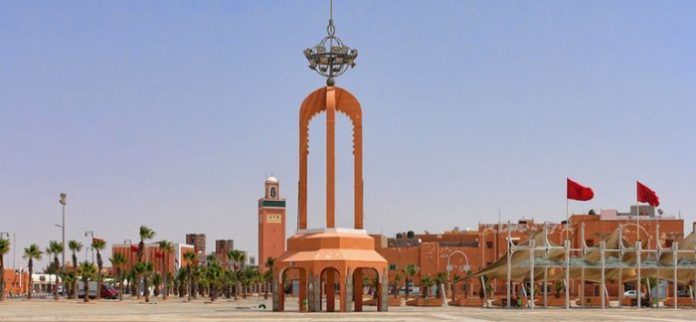Sahara News
by Ali Haidar
Featuring in the citizen-run show “Sahara Debate”, Greek university professor Nikaky Lygeros, a renowned geostrategy expert that has advised several governments, has engaged in an extensive analysis of the fictional nature and the vacuity of so-called “sadr” beyond the discourse of Algeria and “polisario”.
The expert underlined that the myth of this entity is maintained only thanks to the active support of Algeria, which attempts to conceal its geopolitical schemes under a status of “observer state” to the regional dispute on the Moroccan Sahara.
According to the scholar, Algerian manoeuvers are only a smokescreen intended to conceal its role as a main party to this dispute it has itself mounted from scratch.
Mr Lygeros underlined in this spirit that Algeria remains the main political, military, financial and diplomatic supporter of “polisario”, a militia to which it has delegated sovereignty on part of its territory, in violation of international humanitarian law.
It must be recalled that this devolution of authority is a grave violation of the provisions of the Convention on the Status of Refugees of 1951, which provides that the host state remains the primary holder of the obligation to protect the population on its territory. In the absence of reservations on the territorial scope of the Convention’s application, this instrument prohibits Algeria from transferring its sovereignty to a non-state actor, even less so an armed one, on any part of its territory.
Mr. Lygeros methodically deconstructed the claim of “polisario” to representing the populations of the Moroccan Sahara, noting that this entity subsides in the Tindouf camps only thanks to the illegal devolution of authority on the Tindouf camps, which enables it to engage in systematic human rights abuses against a population that is held hostage.
This devolution was condemned by the UN Human Rights Committee in its Concluding Observations regarding Algeria’s fourth periodic report on the implementation of the International Covenant on Civil and Political Rights, in which the body expressed “its concerns over Algeria’s de facto devolution of authority to “polisario”, especially jurisdictional”.
The Greek scholar also underlined that an essential dimension of Algeria’s direct involvement in the regional dispute on the Moroccan Sahara is its refusal to allow a census of the populations of the Tindouf camps, in violation of all the resolutions adopted by the Security Council since 2011.
By refusing to allow the UN High Commissioner for Refugees to allow a census in the Tindouf camps, Algeria enables “polisario” to continue its embezzlement of humanitarian aids intended for the civilian population, thus depriving the latter from the enjoyment of its fundamental rights and violating the basic provisions of international humanitarian law.
In the Greek scholar’s point of view, the manoeuvres of Algeria and “polisario” cannot impede the coherence and the steadiness with which the Sahara’s Moroccanity is being affirmed, in law and fact.
He thus analysed the implications of the delimitation of the Kingdom’s maritime space through the adoption of law 37.17 modifying and completing Dahir no. 1.73.211 of the 2nd of March 1973 on the boundaries of territorial waters, as well as law 38.17 modifying and completing law 1.81, which provides for instituting an Exclusive Economic Zone extending 200 nautical miles from the coast of the Kingdom’s Southern Provinces.
Both laws also determine the baselines and the continental shelf for the seafloor between Morocco and Spain, Portugal, and Mauritania, respectively.
According to Mr. Lygeros, the delimitation of the Kingdom’s maritime space is part of the dynamic of the deepening of the Moroccanity of the Southern Provinces, which also materializes through the economic boom of the region, in the context of the New Model for the Development of the Southern Provinces launched by His Majesty the King in 2015. This Model aims at promoting a holistic socioeconomic development in the region, through strengthening its connectivity, creating integrated competitive clusters, and putting in place a robust good governance framework.
The expert highlighted in this respect that the populations of the Moroccan Sahara participate in the elaboration and the implementation of this development policy through their democratically elected officials within local and regional governance bodies.
Mr. Lygeros underlined that this very coherence undergirded Morocco’s return to the African Union, in line with the Kingdom’s steady commitment to the Continent’s development, under the guidance of the High Vision of His Majesty the King.
Morocco has signed more than one thousand bilateral cooperation agreements with African countries since 2000, in the fields of education and training, health, and sustainable development.
The Greek expert argues that this steady strengthening of the linkages between the Kingdom and its continent made its triumphant return to its institutional family a natural and fluid process. Morocco brings to the African Union its expertise in the key fields of migrations, sustainable development, climate change, and combatting violent extremism, which it shares without ostentation.
Mr. Lygeros developed this analysis in the context of the “Sahara Debate”, a citizen-run show broadcast on social media, intended as an open, democratic platform for serene, dispassionate analysis on the issue of the Moroccan Sahara.







